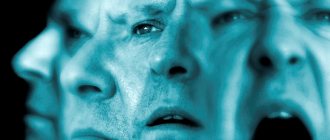Paranoid schizophrenia is recognized as the most common form of this disorder.
Moreover, the term “paranoid” is used in everyday circles, while the official concept is paranoid schizophrenia. The disease combines all the main schizophrenia-like symptoms and signs, but delusions and hallucinations come to the fore in the clinical picture.
How does delusional disorder manifest?
In the case of delusional disorder, delusions of persecution, grandeur, jealousy, and hypochondriacal delusions may be observed. The delusional state can be mono- or polythematic. In some cases, hallucinations are present (usually auditory and visual, but sometimes olfactory and tactile).
This mental illness can be acute, when the delusional state occurs suddenly and passes from a few days to 3-4 months. Or – long-term, if the state of psychosis lasts more than 6 months or during this time the psychosis recurs. Unlike a healthy person, a patient with delusional disorder does not notice obvious things and signs that confirm delusional ideas. This condition can be either within the framework of an acute psychotic disorder or manifest itself in the picture of schizophrenia, bipolar affective disorder, organic brain diseases and other mental illnesses.
Types of delusional disorders
The division of the types of this disease is based on the dominant theme of delusional ideas:
- Erotomania: the patient is sure that some person is head over heels in love with him, but does not admit it. As a result, the patient pursues another person (writes letters, calls, seeks meetings to sort things out).
- Delusions of grandeur: a person believes that he has special superpowers and talents that confirm his genius. The self-esteem of such people is often too high and not supported by real successes.
- Jealousy: it is impossible to convince such a person that a loved one is faithful to him.
- Mixed type: the patient does not have a predominance of one type of delusion, but several types of disorders are observed simultaneously.
- Stalking: a person thinks that someone is constantly watching him and wants to harm him.
- Hypochondriasis: The patient believes that he has a serious and often incurable illness.
- Delirium in the elderly: in old age and old age, brain function is disrupted, such patients start talking, confuse the living and the dead, do not recognize loved ones, they feel that they are being robbed or deprived.
Prevention of delusional disorder
Today, there are no known ways to prevent delusional disorder. The only way to facilitate treatment is early diagnosis of the disease. This will relieve the negative consequences of a mental disorder (loss of a loved one, job, friends, etc.).
Disease prognosis
Delusional disorder can become chronic. But proper treatment will allow the patient to get rid of symptoms and achieve long-term stabilization of the condition. In some cases, due to the peculiarities of the course of the disease, delusional ideas can give way to states of remission. Since many patients do not seek help and do not admit that they have a disease, the disease can progress. In such cases, only the help of loved ones and their appeal to doctors can save a person from tragic consequences.
General information
The state of delirium is a thinking disorder in which ideas, conclusions, and reasoning arise that do not correspond to reality. The patient is completely convinced of his conclusions and judgments and cannot be corrected. As evidenced by Wikipedia and other sources, delusional disorder is a component of symptoms in schizophrenia and other psychoses . Together with hallucinations, delusions belong to the group of “psychoproductive symptoms.”
Delirium is a thought disorder and a symptom of brain damage. Such thinking disorders in psychiatry are classified as pathological judgments. Experts note that delusions are egocentric and affective. Delirium can be treated using methods that act directly on the brain.
Doctors note that in colloquial language the word “delirium” is used in a meaning that differs from the psychiatric one. Therefore, from a scientific point of view, in this case this definition is used incorrectly. What types of delirium exist, as well as how to treat this condition, will be discussed in this article.
Delusional disorder symptoms
Most often, delusional disorder develops with paranoia, when a person is hostile to others and does not trust other people. The first symptoms include the feeling that the person is being directed by some unknown force, is being threatened or wished harm. Over time, the patient’s close and significant people become involved in paranoid delusions. He withdraws into himself, closing himself off from any contact.
The development of delusional disorder can be caused by various factors. In the case of acute psychotic disorder, these are severe emotional shocks: the loss of a loved one, bankruptcy, experiencing a disaster, and others. In chronic psychotic illnesses, most often the basis is a hereditary factor, or the consequences of injury or disease of the central nervous system. Provoking factors for the manifestation of genetic predisposition can be: stressful conditions, negative/unexpected shocks in life, drug addiction and alcoholism.
Diagnostics
To establish a diagnosis, an examination by a psychiatrist and a clinical psychologist is necessary. If a person has signs of a delusional disorder, it is worth urgently contacting a specialist. It must be remembered that without qualified medical care, a patient can harm himself or other people, basing his actions on delusional ideas and attitudes.
During the examination, the doctor talks with the patient and his relatives and conducts psychological testing. The causes of the disease are established. To do this, the psychiatrist may prescribe consultations with other specialists, hardware and laboratory examination methods.
In addition, the physiological state of human health is also determined. Delusional disorder is a serious mental illness that requires long-term monitoring, accurate diagnosis and selection of effective treatment. Therefore, most often, such patients require hospitalization in a psychiatric clinic.
How to recognize delusional disorder
Delusional disorder is a psychosis that can manifest itself in a variety of mental illnesses: paranoid schizophrenia, acute delusional psychotic disorder, organic delusional disorder, paranoid personality disorder, senile dementia and many others. An accurate diagnosis can only be determined by a qualified psychiatrist, since the correct treatment will depend on this.
Case history: somatic delirium of a lawyer
When the 38-year-old lawyer became desperate to find a doctor who could determine the cause of his heart condition, he filed a lawsuit against a major research center. Accurate and thorough examinations of the lawyer’s health did not reveal the expected illness. But a psychiatric examination determined that the lawyer had somatic delusions. Despite the presence of such a mental disorder, the lawyer was highly professional and successful in his work.
Causes
The development of this mental disorder is influenced by a number of predisposing factors:
- genetic – a predisposition to certain mental illnesses, which is inherited;
- physiological – organic damage to the nervous system;
- biological – imbalance of neurotransmitters in the brain;
- psychological – stress, other psychological imbalances;
- social – alcoholism , drug addiction, drug abuse, etc.
Delusional schizophrenia-like disorder often develops due to a genetic predisposition. It may also be related to biological and environmental factors. Schizophrenia-like disorder can manifest itself due to a variety of reasons, the most common of which are the following:
- Temporal lobe epilepsy .
- Neuroinfections - encephalitis , neurosyphilis , etc.
- Tumor lesions of the brain (late stages).
- Traumatic brain injuries.
- Vascular diseases of the brain - severe form of cerebral atherosclerosis , cerebral thromboangiitis , hypertension .
- Toxic effects of drugs.
- Alcohol abuse or drug addiction.
- The influence of toxins .
- Somatic pathologies in which the nervous system is involved in the pathological process (in rare cases).
How to cope with delusional disorder?
The main treatment of this disease is accompanied by the use of medications: antipsychotics, mood stabilizers, anticomvulsants and a number of other medications that eliminate delirium and stabilize the patient’s psyche. In the case of a neurological cause of the disorder, drugs for neuro-metabolic therapy may be added to antipsychotic drugs, resulting in improved brain function. You need to be prepared for the fact that drug therapy often lasts for years, sometimes for a lifetime.
For some hypochondriacal delusional disorders, organic personality disorder, and depressive delusions, it is possible to use psychotherapy: Gestalt, art therapy, body-oriented psychotherapy and some other areas, at the discretion of the attending physician. The use of several methods significantly increases the patient’s chances of recovery and complete cure of the disease.
Medications for treating delusional disorder
Currently, psychopharmacology has a wide range of medications that quickly and for a long time relieve psychosis with delusional symptoms. In addition to antipsychotics, the following may be used:
- atypical antipsychotics: modern drugs that stabilize the levels of serotonin and dopamine;
- sedatives: calm the nervous system, improve sleep;
- antidepressants: improve mood, relieve anxiety;
- mood stabilizers: relieve a manic state and stabilize the emotional background;
- anticonvulsants: control impulsive actions, correct behavior;
- neurometabolic therapy: sedative nootropics, B vitamins, amino acids, vasodilators and other drugs that improve brain processes.
Disease prognosis
Without ongoing supportive treatment, delusional disorders can often worsen, leading to relapse of psychosis. To fully stabilize the mental state, the patient must know that he must take the medications prescribed by the doctor constantly, or at least until they are discontinued by the attending psychiatrist. Since patients suffering from this disease often lack criticism of their condition, the patient’s relatives and friends should take control of their medication intake. Only regular visits to a psychiatrist and compliance with all his recommendations can guarantee the usual course of life for such patients.
Basic scenarios of distorted consciousness
Medicine identifies three common scenarios for distorted perception. These are paranoid, paranoid and paraphrenic syndromes.
With paranoid syndrome, hallucinations and adherence to one topic are observed.
Paranoid syndrome is characterized by fixation on one topic; outside of it, a person’s thinking remains undistorted.
Paraphrenic syndrome is characterized by a person’s fanatical conviction and systematic distortion of perception.
Delusional disorder is treated at the Transfiguration clinic
Psychiatrists, neurologists and psychologists at the Transfiguration Clinic have extensive experience working with patients who have previously been diagnosed with delusional disorder. High qualifications and the use of advanced scientific developments help the clinic’s doctors accurately determine the diagnosis and select the optimal methods of treating mental illnesses. At the Transfiguration clinic you can receive decent treatment and psychological support, which is guaranteed to be received by the patients’ loved ones.
Doctors at the Transfiguration Clinic provide their clients with:
- confidentiality of treatment;
- attentive patient care;
- psychological counseling and assistance to relatives of patients;
- comprehensive modern treatment using the best drugs and therapeutic technologies;
- objective diagnosis;
- individual approach.
You can find out detailed information about the types of treatment, rehabilitation, methods of work and prices at the Transfiguration clinic on the page “Our prices”
Email the Transfiguration clinic and get answers to your questions. Your letters are awaited at
Prevention
Methods for preventing the manifestation of such disorders are currently unknown. The only important aspect of prevention is early diagnosis of the disease that provoked such symptoms.
As for preventing the manifestation of such disorders in patients with mental disorders, the following preventive measures can be provided to them:
- Performing light exercise.
- Listening to relaxing music.
- Drink enough fluids to prevent dehydration.
Cost of treating delirium:
| Services list | Price in rubles | |
| Saint Petersburg | Vsevolozhsk | |
| Consultation with a psychologist | from 3000 | from 2500 |
| Psychiatrist consultation | from 3500 | from 3000 |
| Consultation with a psychotherapist | from 3500 | from 4000 |
| Consultation with a sexologist | 4500 | 4500 |
| Consultation with a narcologist | from 3000 | from 4000 |
| Family psychotherapy session | from 3500 | from 3500 |
| Group psychotherapy session | 1800 | — |
| Psychiatrist's report for reference | 1000 | 1000 |
| Psychodiagnostic examination (2 hours) | 6000-7000 | 6000-7000 |
| Wechsler test | 5000 | — |
| Psychotherapeutic consultation | 11000 | 11000 |
| Psychiatric examination before the transaction | 9000 | 9000 |
| PSYCHIATRIC HOSPITAL | ||
| Standard (4-seater) | — | 5500 |
| Standard+ (2-seater) | — | 7000 |
| Junior Suite (2-bed) | — | 7800 |
| Luxury (2-bed) | — | 8500 |
| Premium (1-seater) | — | 10000 |











